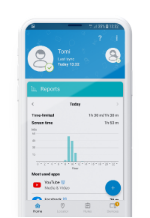Peter Pan fought Captain Hook to protect Neverland. We might not be using swords and flying in the air, but instead, we use our new digital normal to ensure our kids´ childhood stays safe and intact.
Oftentimes our child’s digital safety starts even before they are born. Shared photos of an ultrasound, pregnancy updates, images of our kid’s bedroom decorations and that smiling potty training photo all add up to create your child´s digital trail. This data is stored online for a very long time, making it virtually impossible to get rid of later on in your child’s life.
So what exactly is a digital footprint, and what can you do to give your child the best start on their digital journey?
A digital footprint, or trail, is something we create through each and every action we take online. This information trail can grow in many ways. Whether it be sharing photos, commenting on a video, leaving a review or even online shopping, all of this data is collected and stored. But not all data collected is the same. We have what are called passive and active digital footprints.
ACTIVE is all the data you have deliberately shared online by posting photos, leaving comments, participating in forums, etc.
PASSIVE is information being collected about you without you knowing it, by a website collecting data on how many times you have visited and where you come from, advertising keeping track of your likes and shares on social media, etc.
Why is a digital footprint important?
- It is permanent. Once something is online, it is very hard to get rid of it, meaning it is fairly permanent and is almost certainly stored somewhere.
- It creates one´s digital reputation. Whether we like it or not, our online presence is a part of our persona, and people might use it as a viable source of information about us.
- Online content is forever public. Once something is shared online, other actors might misuse it, alter it, etc.
- Your digital footprint may be exploited. Some cybercriminals leverage people’s public data and digital footprint, with phishing and identity theft being the most common approaches.
What can you do to protect your child´s digital footprint?
A digital footprint is something virtually unavoidable in our day and age, or at least very hard to escape (one would have to never use a device connected to the internet). However, you can follow a few rules to make your child´s digital and offline future a bit safer.
- Consider the embarrassment factor. These are things you should consider before posting about your child. Experts agree that there are three main factors that determine whether a post is appropriate or not: Content. Comments. Coverage. Ask yourself, is this potty-training photo appropriate to share with strangers on the internet? Is this comment on my child´s weight okay to say out loud in a public place? How will my child feel about me posting 30 photos of them in a few years’ time?
- Ask permission. From a young age, teach your kids that asking permission to post about other people online is a must. And since your kid is too young to give you permission, think twice before uploading something online that they might not be comfortable with in the future (such as a baby tantrum video). They’ll thank you later.
- Privacy. Make sure your accounts are set to private and that only people you trust are in your friends' list or among your followers. By not having a public account, you eliminate a lot of the risk of misuse and alteration of your child’s photos.
- Have a talk about online safety and data collection. Explain to your child what it means to lead a life accompanied by the internet. Talk to them about privacy and safety.
A digital footprint is permanent and easy to access. It is created from the information we share willingly, but also data that is being collected about us.
By taking these simple steps, you are not only protecting your children online but from a young age teaching them about proper online etiquette and healthy boundaries. You, after all, are their gateway into a healthy relationship with themselves and the online world. One day they will thank you for it, as they grow up to be more responsible internet users. And most importantly, make sure you have an open relationship with your children, so they feel safe and free to come to you, ask questions and voice concerns on anything and everything online and offline.


